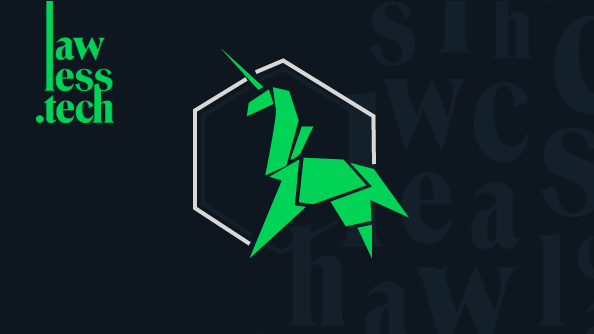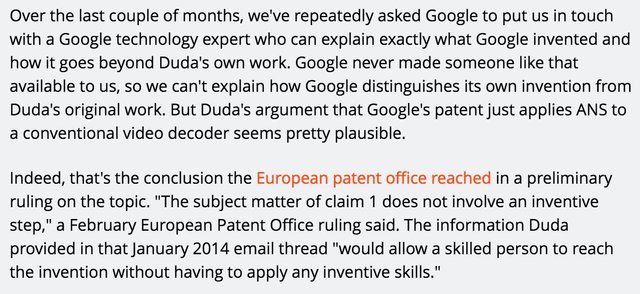Patent Wars Get Personal: Developer Jarek Duda Claims Google Patents His Public Domain Contribution

The issue of interaction between giant international corporations and humble human beings has been, at least most of the time, one of the major concerns for cyberpunk fiction. The genre’s cornerstones like the original Blade Runner or Total Recall (1990) tend to depict corporations as inhumane entities throwing the world into the gorge of dystopian nightmare, and regular people, the protagonist included, as powerless screws in this gargantuan machine. The main conflict in such futuristic exercises lies in the person’s attempts to bring back the freedom taken away by a corporation. Quite usually, such entities don’t even have a name (possibly implying that you don’t need a name if there’s only one of your kind in existence). Plus, the very word “corporation” sounds ominous enough in the dystopian discourse.
Still, while fiction is always an exaggeration to a point, the conflict between people and corporations is quite real these days. However, instead of a cyberpunk horror with androids, memory change and flying cars, today it lies in a seemingly boring realm of patents, as a recent case shows.
Jarek Duda vs Google
Dr. Jarosław (Jarek) Duda of Poland’s Jagiellonian University has invented so-called asymmetric numeral systems (ANS), a data compression technique that allows one to accurately represent data using less bytes of information. Mr. Duda was generous enough to dedicate the system to the public domain, which means that anyone had the right to use it. And so they did: enormous corporations like Apple, Facebook, and Google have all created software that makes use of Mr. Duda’s invention. Still, Google has filed a patent application for ANS, which inevitably ignited an extensive debate.
Google claims that the patent in question is indeed based on Mr. Duda’s invention, however, the invention, according to Google, is more of a theory, and therefore cannot be subject to patenting, unlike the very substantial piece of software it actually wishes to patent. Still, Mr. Duda has proved that he talked with Google engineers offering them the exact same solution via email. The legal proceedings are not over, however, Europe’s patent authorities have already issued a preliminary ruling in Mr. Duda’s favor.
“The subject matter of claim 1 does not involve an inventive step. [The information provided by Mr. Duda to Google via email] would allow a skilled person to reach the invention without having to apply any inventive skills,” the European patent office stated
Google says it will wait until the U.S. Patent and Trademark Office has its final saying.
Waging Patent Wars 101
A patent is a very powerful thing. Though it is commonly perceived as a legitimate proof that someone has indeed invented something, it is actually a legitimate proof that someone has exclusive rights to use a certain invention. In most cases, of course, this right is directly associated with the person’s priority in inventing something, however, as Mr. Duda’s story shows, that’s not always the case.
Patent wars are commonly associated with big corporations. The most prominent cases of such battles usually involve Apple and some other corporate leviathan like Samsung, Nokia, or HTC. Those disputes mostly concern illicit use of some design features (as in Apple vs Samsung), user interface and operating system (Apple vs HTC), or wireless standards (Nokia vs Apple). Still, patenting isn’t just a fun reserved exclusively for big companies: thus, Ventureburn recommends every little startup to patent their work or inventions, not just because potential investors like to see such a work officially recognized, but also because corporations don’t exclusively wage wars with their peers. Plus, of course, having a monopoly on a new technology seems to be a nice thing on any level, from licensing fees to protecting your intellectual property. Mr. Duda’s case, even though the inventor doesn’t wish to profit from his invention but only to make it freely available to anyone, is yet another proof why patenting is actually a big thing.
The author of the article that brought that situation to media’s attention, Timothy B. Lee, seems to be with Jarek Duda on this one:

The creator of a groundbreaking compression algorithm called ANS says that despite his objections, Google is trying to patent the application of ANS to video compression. His argument makes sense to me.
Founder of Research Through Gaming Betty Adamou also agrees that Google has shown unsportsmanlike conduct:
This story has many levels of depth but ultimately without Jarek Duda, Google would have nothing to try and patent and should show good sportsmanship by respecting his decision and at the very least, reference him as the inventor of ANS. Cheers for sharing
Still, not everyone thinks that the inventor is indeed entitled to go against Google. Thomas Daede, the developer of free video codecs at Mozilla, noted:
ANS didn't make it into the final AV1 spec, so it's not required that Google license that patent (but I hope they do, and it's good to ask for it). And yeah, even Xiph has defensive patents. See also Monty's blog post a year ago when this came up: https://xiphmont.dreamwidth.org/84214.html
Xiph referenced in his tweet is a NPO consisting of “loosely grouped” coded projects. Their codec Vorbis was used by Google as the audio codec for WebM. Notably, Xiph has intellectual property as a non-profit, which means that the fate of their patents, should the company go bankrupt, will be decided by the board. In a for-profit company, the patents go to whoever has bought the bankrupt entity’s assets. Many patents are “defensive,” meaning that its primary intention is to protect a company against infringement lawsuits, not to license its use by third parties.
When it comes to the dispute over ANS, Google claim their attempt to patent the technology won’t lead to its complete appropriation.
“Google has a long-term and continuing commitment to royalty-free, open source codecs (e.g., VP8, VP9, and AV1) all of which are licensed on permissive royalty-free terms, and this patent would be similarly licensed,” the company’s spokesperson told Ars Technica.
In layman’s terms, it means that the codec in question will be free to use as long as Google gives its consent to do so. This, however, doesn’t really convince the inventor, who said:
“We can hope for their goodwill; however, there are no guarantees. Patents licensed in permissive royalty-free terms usually have a catch.”
For that reason, he wants to be recognized as the original inventor, and have legally binding guarantees that the patent will remain publicly available to anyone.
Conclusion
This story shows the complexities and intricacies of patent law, and arguably proves that having a defensive patent isn’t really a bad idea if you don’t want your invention to be devoured by a big corporation. Had Mr. Duda had such a patent, he wouldn’t have to get involved in a patent war with a giant international corporation, and, moreover, could have had it his way and let everyone use his invention on a pro bono basis. There is no public evidence that Google somehow tricked him into providing them with information that “would allow a skilled person to reach the invention without having to apply any inventive skills.”
On the other hand, it’s certainly reasonable to remember that a corporation will always pursue its own interests above all, be it in a cyberpunk dystopia or not. After all, that’s more than reasonable from the corporation’s point of view. The law is always on the side of whoever knows it better, and that might be the biggest lesson here.
This post originally appeared at https://lawless.tech/patent-wars-get-personal-developer-jarek-duda-claims-google-patents-his-public-domain-contribution/
lawless.tech is an online magazine devoted to covering the ongoing regulatory attempts to oversee and control the newest technologies
Join our Telegram channel, follow us on Twitter and Facebook to explore how regulations will impact the latest technological advances.
Good argument for a defensive patent! Google has no soul, and must be legally limited to avoid "legal" corporate bullying! resteeming.
>:(